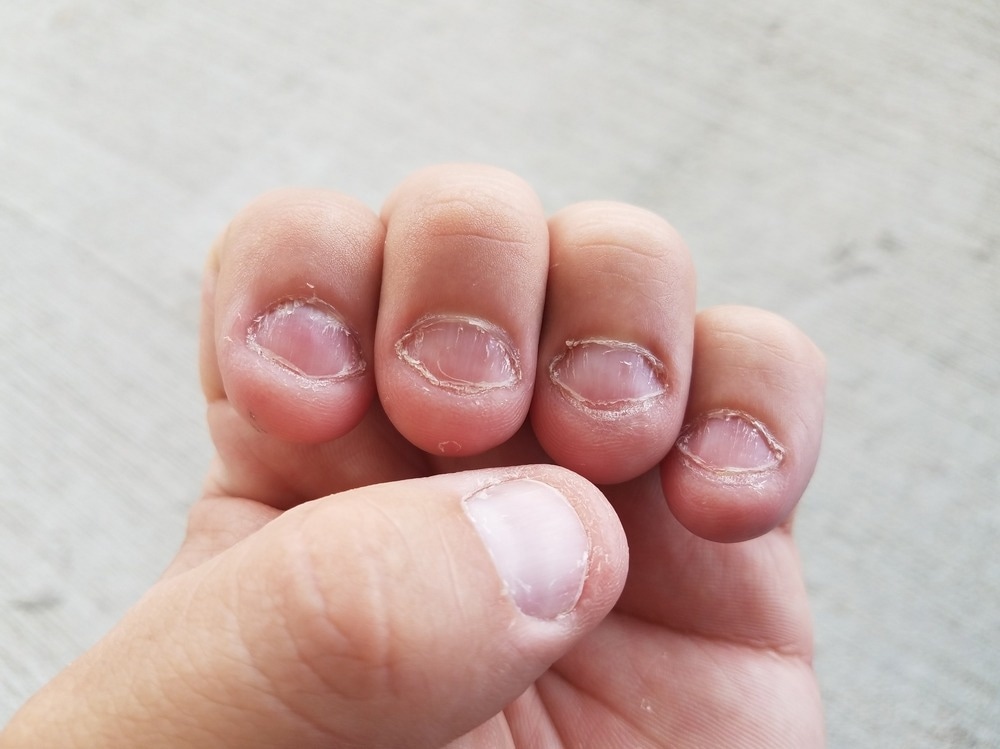Introduction
Is Nail Biting Actually a Medical Condition?
Nail Biting and Young People
The Psychology of Nail Biting
References
Further Reading
Nail biting is a common behavior often viewed as nothing more than an annoying habit. The behavior is all too often ignored. However, nail biting can be serious and it is a misunderstood and misdiagnosed disorder. This article probes nail-biting as a medical condition, seeks to understand who is most likely to be afflicted by the distressing condition, and looks at its association with mental health conditions.

Nail biting. Image Credit: Krakenimages.com/Shutterstock.com
Is nail biting actually a medical condition?
Nail biting is known medically as onychophagia. It is a type of self-grooming behavior involving biting and chewing the nails, including the toenails. It is a destructive habit, especially when it is repeated and exhibited in response to stressful circumstances.
Nail biting can lead to serious problems such as infection and mental health conditions.
And yet onychophagia currently resides as a non-official diagnostic entity. In recent years the problem has been receiving an increasing amount of scientific attention and several articles have appeared in popular media attesting to the potential gravity of the condition if it is left untreated.
Nail biting sits among other conditions such as trichotillomania (skin picking) under the umbrella of pathological grooming. Research has been carried out to try to understand whether these conditions all stem from similar underlying tendencies. A related psychiatric disorder is known as onychotillomania and is associated with chronic picking and manicuring the nails.
Nail biting and young people
Nail biting is prevalent in children and adolescents. It occurs in 20-33% of children and nearly half of teenagers ––a whopping 45% (Siddiqui et al., 2020). Although the problem is much reduced approaching adulthood, in some it does unfortunately persist.
In the US, research has shown that up to one in three people meet the clinical diagnostic criteria for the presence of at least one pathological grooming behavior. This statistic is rather surprising given the figures are greater than those for depression, anxiety, and alcohol abuse (Maraz, et al. 2017; Bijil et al., 1998; Offord, et al., 1996).
What are the reasons behind nail biting? Research has revealed the following common reasons for the behavior (Siddiqui et al., 2020):
- Nervousness: Due to stress and anxiety. In this instance, nail biting is temporarily appealing due to the calming effect it has on the nervous system
- Emotions: Our emotional make-up is integral to why we turn to nail biting. Shyness and low self-esteem can have an effect in addition to the pain caused by highly traumatic life events such as death or divorce
- Perfectionism: As discussed above those with this trait exhibit a low tolerance for boredom and frustration that is alleviated by nail-biting
- Boredom: due to inactivity/for want of finding something better to do
- Imitation: Children copying adult behavior
- Psychosomatic: This is usually seen in aggressive families
And this list brings us to the psychology of nail-biting, a behavior frequently associated with mental health conditions and, less obviously, with a particular type of personality.

Nail biting. Image Credit: stockphotofan1/Shutterstock.com
The psychology of nail biting
Mental health conditions associated with nail biting can involve severe emotional distress, depression, and anxiety. In the Diagnostic and Statistical Manual of Mental Disorders Fifth Edition (DSM–5), NB is classified as an "Other specified obsessive-compulsive and related disorder" with the specification of “body-focused repetitive behavior (BFRBs)," whereas the International Statistical Classification of Diseases and Related Health Problems ICD-10 classifies the practice as "other specified behavioral and emotional disorders with onset usually occurring in childhood and adolescence" (Siddiqui et al., 2020).
Common psychiatric conditions linked to nail biting in children are attention deficit hyperactivity disorder, oppositional defiant disorder, and separation anxiety disorder. In addition, some other co-morbid disorders include major depressive disorder, tic disorder, forms of obsessive-compulsive disorder, enuresis (involuntary urination), mental retardation, pervasive developmental disorder and sometimes also generalized anxiety disorder and panic disorder.
There is a classification system linked with nail biting as follows (Siddiqui et al., 2020):
- Nail biters who do it without realizing
- Nail biting to control anxiety
- Nail biting for the purposes of attention seeking
- Self-injurious nail biting to control aggression
- Nail biting as part of the obsessive-compulsive disorder spectrum
- Nail biting according to the DSM-5: other specified obsessive-compulsive and related disorder
- Nail biting according to the ICD-10: other specified behavioral and emotional disorders with onset usually occurring in childhood and adolescence
- Nail biting that is classified as Pathological and Non-pathological
It is thought that nail biting may also be linked with having a perfectionist personality type. Perfectionism is associated with a low boredom threshold and a much-reduced tolerance for frustration.
So, what can be done for those suffering from this all-too-common disorder? To begin with, raising awareness about the condition and its impact seems to be a good place to start. In terms of dealing with the condition, certainly in children, admonishment is completely ineffective. However, positive reinforcement and behavioral modification techniques have so far shown much promise.
References
- Bijl, R. et al. 1998. Prevalence of psychiatric disorder in the general population: results of The Netherlands Mental Health Survey and Incidence Study (NEMESIS). Soc Psychiatry Psychiatric Epidem. Doi: 10.1007/s001270050098
- Maraz, A. et al. 2017. Pathological grooming: Evidence for a single factor behind trichotillomania, skin picking and nail biting. PLoS One. Doi: 10.1371/journal.pone.0183806
- Offord, D. et al. 1996. One-year prevalence of psychiatric disorder in Ontarians 15 to 64 years of age. Can J Psychiatry. Doi: 10.1177/070674379604100904
- Siddiqui, J. 2020. Onychophagia (Nail Biting): an overview. Indian Journal of Mental Health. 7: 97.
Further Reading
Last Updated: Jul 27, 2022